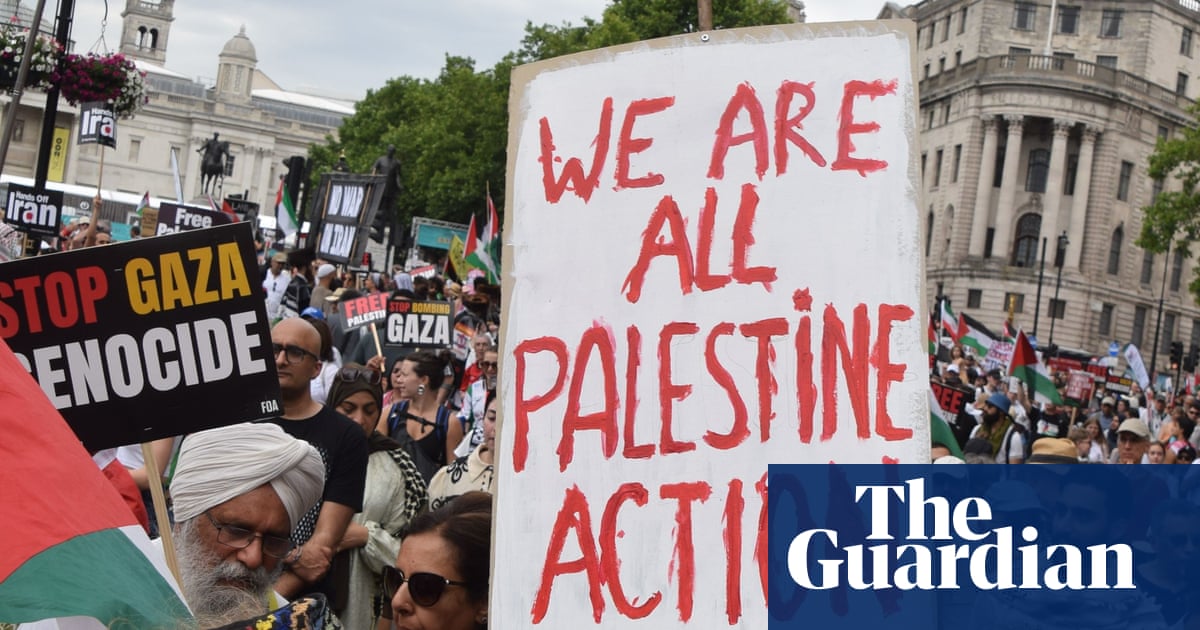I am a former chief constable, and once attempted to become a Labour police and crime commissioner. I’m not therefore someone easily categorised as a supporter of terrorism or criminal activity. The decision to proscribe Palestine Action as a terrorist group is beyond satire (Report, 20 June). I suspect that embarrassment over hilarious security failures at an RAF base may be clouding judgment and good sense.
Proscribing a group for peaceful protest – albeit illegal – is a disgrace. It is nearly as disgraceful as the continued UK support for the apartheid, ethnic-cleansing Israeli state. If the home secretary is so keen to proscribe an organisation, why not proscribe the terror group known as theIsraelDefense Forces? They kill innocent people daily, and yet my voted-for government does absolutely nothing.
Words mean nothing. Israel’s leadership ignores them, yet our government persists in arming it. The proposal to proscribe Palestine Action is undemocratic and, frankly, shameful. It is an abuse of an important law – one here being used to suppress support for Palestinians. The home secretary appears to have left reason behind.Meredydd HughesBradwell, Derbyshire
The plan to proscribe Palestine Action represents a failure of this government to engage in meaningful discussion with all those who deplore Israeli actions in Gaza and the West Bank, and our government’s support of those actions. The protest group has made it clear that their reason for using spray paint on two planes was to draw public attention towards RAF logistical support for Israeli actions.
That logistical support has taken many forms, and the public is only aware of some. At the same time, the government has often condemned Israel’s genocidal policies. It should not be surprised when its support for Israel leads to alarming reactions. I recently joined a large, friendly and peaceful march in London in support of the Palestinian cause. I dearly hope the home secretary will consider the British history of tolerance of protest in her future policies.Simon BarberUttoxeter, Staffordshire
The government responds to a few people spraying paint and breaking windows by declaring them “terrorists”. If that is terrorism, then the word loses all meaning. Banning them – and their supporters – could be justified if they have carried out, or advocate, a campaign of murder and/or bodily harm. But unless the government can provide evidence of the latter, then proscribing a group that is protesting against a war is ludicrous, and sets a very dangerous precedent.
Are the anti-frackers terrorists? Hunt saboteurs? Even last year’s rioters weren’t called terrorists, yet they caused mayhem in many towns and cities. No one is safe if proscription becomes the norm.Peter LoschiChadderton, Greater Manchester
So now you’re a terrorist if you protest against the government supporting genocidal acts on innocent people? A small act of vandalism is hardly blowing people up, but this government is supporting murderous behaviour in Gaza in all our names, no matter how many times we take to the streets or write to our MPs. The suffragettes would have been branded terrorists if we used this criterion. I’m not a member of Palestine Action, but they sound just like my kind of people.Mary GildeaCharlton, London
Have an opinion on anything you’ve read in the Guardian today? Pleaseemailus your letter and it will be considered for publication in ourletterssection.
